Amanda Obidike is the CEO of STEMi Makers Africa, an initiative where she developed a first-to-market, teacher-centered learning management solution for African educators to organize virtual lab sessions, assign project-based work with little or no internet required, and assign research assignments to students as they build, create, and pursue STEM and Innovation careers. Through this innovation, she became a Breakthrough of the Year Finalist – Falling Walls, Berlin and Global 20 Goldman Sachs winner. She has also been celebrated by Forbes Science as an African changing the culture fabric for young talents to embrace opportunities in Science and Technology.
Being under-employed in 2017 made her realize that 83.5% of graduates do not have the required technical skills for lucrative and meaningful jobs available in Nigeria. Her professional goal addresses the leaky unemployment pipeline, the under-representation of young women and girls in STEM, and the integration of STEM education in classrooms across Sub-Saharan Africa.
She emerged 40 Under 40 in the Economic Development Award, a Techwomen Awardee by the U.S. Department of State, 50 Most Influential Women in Nigeria, and Winner of the UK’s foremost award, the FDM EveryWoman in Technology in 2022. Amanda is also a Researcher at the UNESCO Inclusive Policy Lab and was recently a UN Women UK delegate for the CSW67 in 2023.
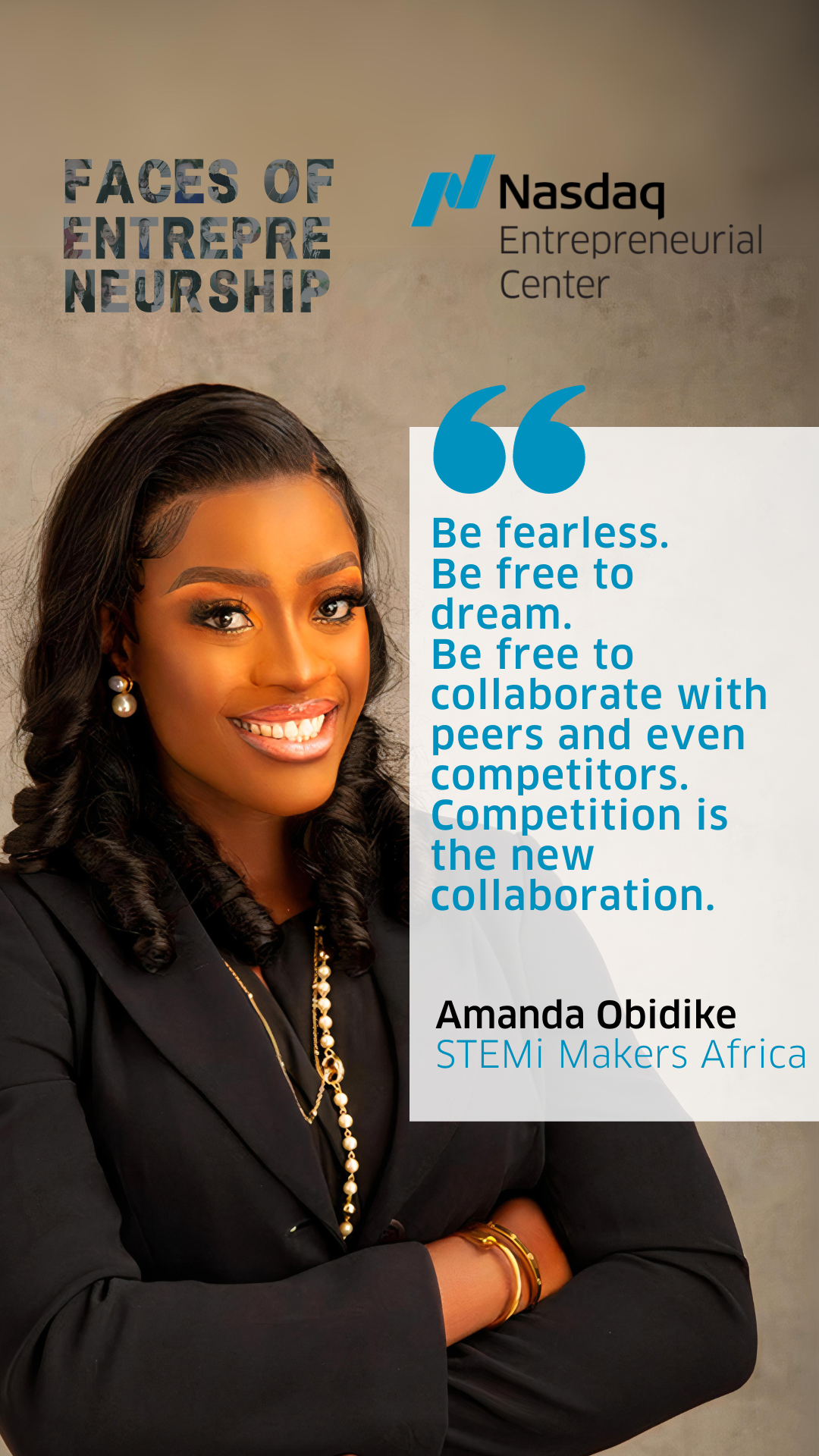 What does “entrepreneurship” mean to you?
What does “entrepreneurship” mean to you?
Amanda Obidike: In my work to address the leaky unemployment pipeline and foster socio-economic development for all, entrepreneurship is a persistent spirit and a positive attitude in optimizing resources to fit the needs of communities and achieve a vision. It is about offering a unique value that makes a difference in your life and the life of others.
Tell us about your first experience with entrepreneurship.
AO: The inspiration of entrepreneurship comes from my family. I grew up with both parents who were traders. I looked forward to applying entrepreneurship differently by integrating technology and data for better decision-making. I started my first company – Calal Global – that recognizes budding technology by adopting predictive analytics and helping local SMEs leverage on big data analytics. It was an experience that began as an adventure right after I got trained by IBM on business intelligence in 2018. Since then, I established STEMi Makers of Africa by leveraging on business relationships and trust from women-owned businesses, partnerships, and the pro-bono data consulting space.
What is your company’s origin story? What is the biggest reason you started your business? What did those early days look like and teach you?
AO: STEMi Makers of Africa was established after I realized the leaky unemployment pipeline and fragmented education institutions in Africa. In Nigeria, most undergraduates leave the four walls of the academic institution without having the necessary background knowledge/skills required by the job market. As our workforce is gradually changing to be more technically inclined, students alongside aren’t prepared for these changes and therefore, it results in their inability to transition from education to employment.
I was part of this system and right after I achieved a mastery certification in data science, I decided to set up an initiative (STEMi Makers of Africa) that unites, prepares, and empowers educators to integrate project-based learning in classrooms for students to understand 21st-century skills and also address the underrepresentation of women and girls in STEM by providing mentorship, trainings and the confidence needed to succeed in the workplace. The early days taught me perseverance to breakthrough, especially as I tried to build an MVP and learning management platform for schools in under-served communities to access.
What do you wish you knew when you started? Is there anything you would do differently?
AO: I would say I am glad I knew less when I started. It was the limitation in knowledge that made me strive to see my business come to fruition. I have a mentor who once told me that if you are waiting to have all the knowledge and resources to begin a project, you just might not get the corresponding energy and faith to begin the project.
What does “success” look like for you? We’d love to hear your biggest, boldest dream. What do you think will help you achieve it?
AO: Success is about impacting the lives of others. For me, the most rewarding experience of success is seeing STEMi services in the mouths of people and the communities we serve. I am proud of the success stories and feedback from recipients of the Project Kuongoza mentoring program for women and girls spanning 21 African countries. I am also proud of the novel innovations we have seen students come up with through our trained educators.
What is your superpower as an entrepreneur? What is your proudest and darkest moment so far? Share a key high and a key low from your journey if you can.
AO: My superpower as an entrepreneur is persistence and the ability not to take a NO answer. I am for the school of thought that emphasizes how resources do not naturally come to us, but we should identify and grab it. This attribute has made me excel in the business world and STEM space mostly dominated by men. I got a few feedback from people who took my persistence for being self-willed and forceful. Persistence can be a weakness sometimes, but I have used it as a weapon to achieve what I want. On the other hand, there are partners and stakeholders who perceive persistence and a can-do spirit as a goal driven leader.
Proudest moment.
It has fetched international partnerships and grants, a platform to discuss with key actors from around the world and also translate enthusiasm to teams who carry on and run with the business goals.
What are your personal driving principles, your top values?
AO: My values are built upon a foundation of making social impact progress and inspiring others in the wake to follow.
How have your personal principles and values shaped your company’s values and principles? Give us some examples.
AO: In 2021, I was celebrated by Forbes Science as an African changing the cultural fabric for young women and girls to embrace opportunities in Science and Technology. This stemmed from leading a cross-functional team during the COVID-19 pandemic – as a result of the social exclusion – across 21 African countries in designing a technology solution that makes STEM education to be accessible, equitable, and inclusive for young women in MENA nations and Africa. The technology solution – Project Kuongoza mentoring program – combines capacity development in STEM and mentorship to support women aged 15 – 30 access mentors in the diaspora, internships, and integrate these learned skills needed for the workplace – after being mentored. Through this initiative, I championed the highest groundbreaking record of 1,895 young girls in Africa and provided career opportunities to 118 women as of 2022.
As a result of my value and interest in education, I was selected to serve on the technical policy cluster of the African Union Continental Education Strategy for Africa (AU CESASTEM) to operationalize strategic objectives on sustainable development with youths being guaranteed full access to education, training, skills, and technology necessary to realize their potential. We have made progress in aligning national plans of educators’ training, including monitoring mechanisms with CESA 16-25 targets and we are planning ahead not to leave the younger generation feeling displaced and inheriting a more fragmented world than we live in today.
Have you raised outside capital so far?
AO: Primary capital raised has majorly been bootstrapping and grant funding.
Due to the nature of our incorporation, it was not advised we launched in venture capital and equity funding. There are a lot of expectations and targets that come with such a capital. Bootstrapping and grant funding was one of the best ways we launched, especially given what our primary outcome was: impact first, profit second.
Where do you meet investors?
AO: I would like to say “partners”. I meet most partner organizations and representatives during speaking engagements. It’s a way to perfectly hear and understand the work I do. They usually resonate with my approach in STEM and youth upskilling and then we take the conversation beyond the sessions.
What’s it like to work alone or with your partners?
AO: Oftentimes, I take the sole responsibility in implementing senior-level strategies and actions in complete coordination with the board of trustees. Businesses cannot survive without having good contracts and networks that drive company goals. The board provides short- and high-level advisory to attain a crucial yet profitable contract for STEMMi Makers of Africa in the long run. With their networking formula, STEMi creates and taps into new business opportunities.
My responsibility entails building partnerships and collaborative relationships with esteemed organizations in pivoting STEM education and project-based learning in the African classrooms. For example, we have been awarded multiple grants on STEM Integration and Development Training for Educators in partnership with the U.S Consulate, Nigeria to refine 2,500 Educator’s instructional pedagogy where students will be allowed to solve ill-defined problems, make real-world connections while deepening content knowledge and preparing them for STEM careers by also setting up 200 STEMi Clubs in South-Eastern Nigeria. Today, our train-the-trainer model is replicated to support over 11,000 Classrooms and 15 tertiary institutions through partnership with Oracle Academy, Microsoft, and IBM who believe in helping Africans to become technology innovators and leaders.
Do you have a mentor? Tell us about what makes them valuable to you and your business.
AO: Absolutely! It’s one of my success strategies. The ability to be measured and accountable before your peers, senior professionals, and even team members. Mentoring has been an opportunity to revalidate and improve STEMi on a periodic basis. I have a network of mentors – each exceeding a unique aspect of expertise to draw support, courage, and correction. Whether in finances, sustainability, partnerships, mental health, etc. There are occasions where coordinating objectives can be a daunting task, one that requires determination, creativity, and a willingness to take risks. The impact of these mentors prove to be a valuable tool in the journey to success.
What role does mentorship play in your world (as a mentor or mentee)?
AO: Mentorship is very vital if you want to succeed in business, creating a work-life balance, and providing support on challenging life decisions. I came across an article that stated 70% of small businesses that receive mentoring survive five years or more, twice the rate of those who don’t have mentoring relationships.
Mentoring has provided tangible advisory, lasting connections, and networks in accessing resources I least would have imagined. Mentoring is also friendship where you are vulnerable to seek and ask for help without fear of being misunderstood or seen as being weak.
Many entrepreneurs continue to perfect their daily routines to support their work and greater vision; would you mind sharing your morning routine or a regular ritual that grounds your work each day?
AO: A typical morning routine is to meditate for 30 minutes. I practice mindfulness to start the day on a positive note, bolster my cognitive behavioral performance, and adequately plug energy required of me to perform. In today’s business world where things are moving so fast, meditation routine helps me to memorize information, process it quickly, and recall when required.
Beyond these business acumen and advantages, meditation provides an array of health benefits, such as lowered blood pressure, bolstered immune function, and a reduction in symptoms linked to anxiety and depression — especially for women with young families.
What are you reading or have read?
AO: I stumbled upon “The Untethered Soul”, by Michael Singer. It’s a book on spiritual leadership that helps us pursue an inward journey by observing our ego more objectively and dispassionately. By untethering ourselves from the automatic thoughts and emotions that limit our conscious awareness, you can open the door to growth.
Where do you go for inspiration?
AO: I would like to use “rejuvenate” as an adverb to describe inspiration. Sometimes when I realize how anxious and weary I become, I pull away and take a solo trip. It’s a way to shut down noises, tension, and sometimes, desperation. I derive this rejuvenation alone through solo walks on a beach.
Do you have a favorite quote, mantra, or words of wisdom to get through the tough days?
AO: Our strength is not what we can do. Strength comes from overcoming the things we once thought we couldn’t.
What is a problem that keeps you up at night?
AO: Study of STEM subjects has been made unexciting over the years. Over 72% of students cannot effectively transition from education to STEM careers. My vision is to break the wall of inheriting fragmented and disconnected practical education in African institutions. Seven in 11 Educators (nearly 65 percent in Africa) do not have access to simplify STEM subjects using future-focused teaching tools, project-based learning resources, and improved knowledge on STEM curriculum needed to be integrated in the 21st-century classrooms.
I always look forward to deepening students’ understanding of key science concepts, skills and fully engage students in their learning while educators can easily move toward outcomes-based education by infusing key STEM content into their curriculum.
What do you think about helping others through your work?
AO: My work at STEMi Makers of Africa caters for marginalized educators and students and examines how tailored education programs, development policy approaches influence their lives, and upskilling of talents to improve the life-chances of being self-reliant and ready to compete on a global level.
If current trends continue, by 2050 some one-third of Africa’s one billion young people will lack basic proficiency in math, reading, and science subjects. Millions will be unemployable and unproductive.
I help stakeholders and teams operate with problem-solving approaches, cross-cultural competence, communication and design thinking as a method of revolutionizing STEM Education in Africa. It helps the now well-trained educators be able to bring their first-hand know-how in mentoring students, introduce an effective teaching system to enable them to integrate pedagogical techniques and fully understand the ways students absorb STEM concepts.
What advice do you have for fellow (and aspiring) entrepreneurs building and leading teams?
AO: Be fearless. Be free to Dream. Be free to collaborate with peers and even competitors. Competition is the new collaboration. As young entrepreneurs, we may also experience burnout and exhaustion. Prioritize your health and select what you take into your system (food, mental energy, gossip, etc). Learn to redirect your energy to optimism, hope, and kindness. Feel free to reach out to the peers you admire and vertical/horizontal professionals (in and outside of your line). There are a lot of resources you can leverage outside your business brand space.
Utilize the power of mentoring for accountability and growth.
What kind of an entrepreneur do you want to be known as – as in, what do you want your legacy to be?
AO: I look forward to leaving an indelible mark in STEM integration across Africa to further establish Educator and Learner Standards in STEM education to deepen students’ understanding of key marketable skills and fully engage students in their learning while Educators can also easily move toward outcomes-based education by infusing key STEM content into their curriculum.
Do you have someone you’d like to nominate to be profiled in our Faces of Entrepreneurship series? Please let us know by emailing media@thecenter.nasdaq.org or submitting your nomination using this form.
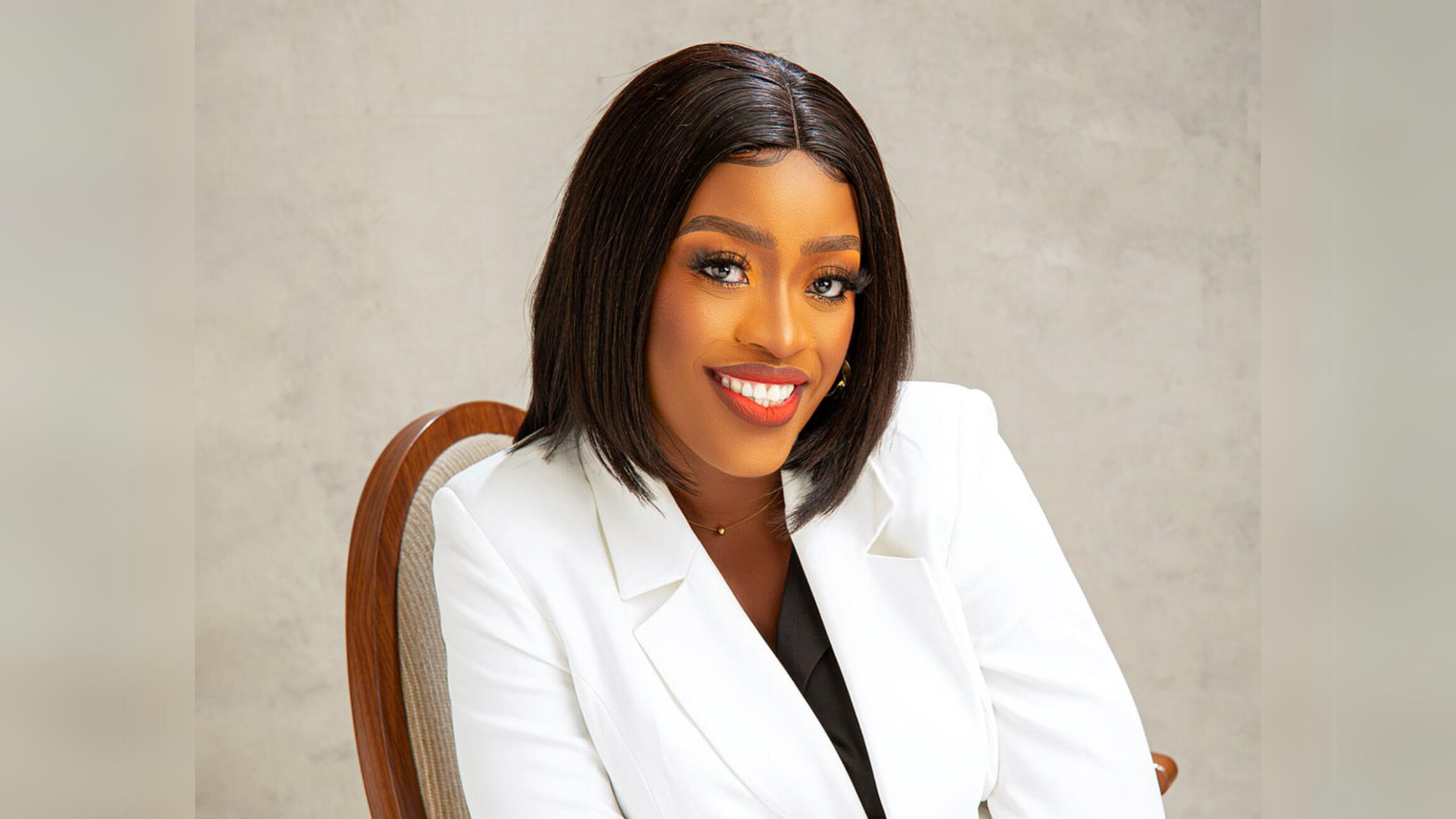
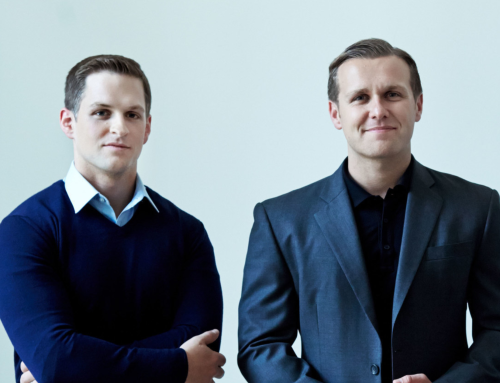
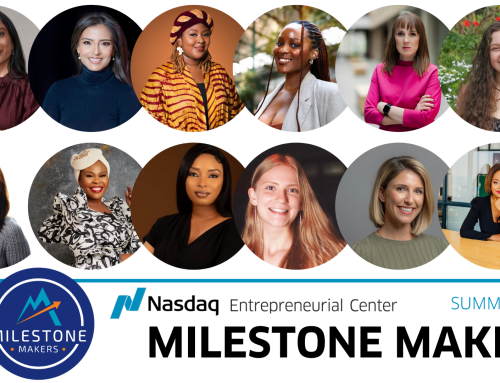
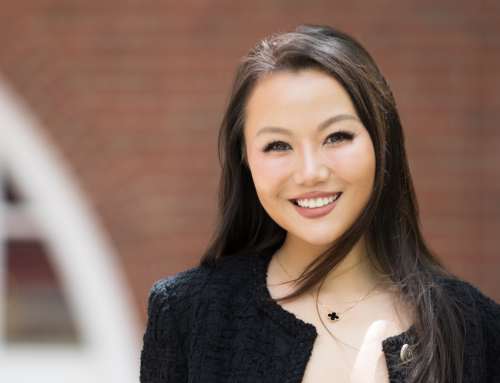
Invite a Friend
Close